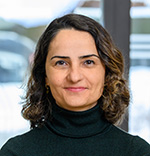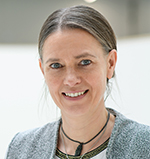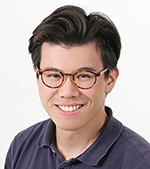The "GSCN 2025 Young Investigator Award" goes to Aydan Bulut-Karslıoğlu of the Max Planck Institute of Molecular Genetics in Berlin.
The GSCN 2025 Hilde Mangold Award goes to Michaela Frye from the German Cancer Research Center in Heidelberg.
The GSCN Publication of the Year Award 2025 goes to Bryce Lim, Aryan Kamal, … , Judith Zaugg and Moritz Mall. They receive the "GSCN 2025 Publication of the Year Award" for their joint publication "Active repression of cell fate plasticity by PROX1 safeguards hepatocyte identity and prevents liver tumorigenesis” in the journal Nature Genetics 57, 668–679 (2025).
Find the GSCN press release Molecular Insights into Early Development and Cancer Formation  here
here
Finden Sie die GSCN Pressemitteilung Molekulare Einblicke in frühe Entwicklung und Tumorentstehung  hier
hier
About the Awardees:
GSCN 2025 Young Investigator Award
 Aydan Bulut-Karslıoğlu
Aydan Bulut-Karslıoğlu
© David Ausserhofer, MPI
Aydan Bulut-Karslıoğlu receives the GSCN 2025 Young Investigator Award for her research on mechanisms regulating stem cell state transitions and fate commitment. Her lab studies mammalian embryonic diapause – a reversible dormant state that gives embryos extra time to develop to increase chances of survival. Dr. Bulut-Karslıoğlu and her team made a series of discoveries on metabolic and epigenetic regulation of this dormant state, shedding light on this once mysterious phenomenon. Her team’s additional work on oxygen sensing showed the extent to which stem cell fate decisions are influenced by the cellular environment. Through different approaches, the lab seeks to understand the fundamental processes of communication and information flow at genetic and cellular levels.
Link to Aydan Bulut-Karslıoğlu’s working group.
Aydan Bulut-Karslıoğlu received her PhD in 2013 from Max Planck Institute of Immunobiology and Epigenetics in Freiburg, where she worked with Thomas Jenuwein on epigenetic mechanisms. In 2013, she joined Miguel Ramalho-Santos’s lab at the University of California San Francsico as a postdoc. During this time, she discovered mTOR as a regulator of developmental timing in the mouse. In 2018, she received the Sofja Kovalevskaja Award to start her independent research lab at the Max Planck Institute for Molecular Genetics in Berlin. Dr. Bulut-Karslioglu received an ERC Starting Grant in 2023 and ERC Proof of Concept Grant in 2025.
GSCN 2025 Hilde Mangold Award
 Michaela Frye
Michaela Frye
© J. Jung, DKFZ
Michaela Frye receives the GSCN 2025 Hilde Mangold Award for her achievements as a stem cell researcher and role model as outstanding female scientist. She is head of the Regulatory Mechanisms of Gene Expression department at the German Cancer Research Center (DKFZ) in Heidelberg. Her groundbreaking research focuses on chemical RNA modifications that contribute to the development of cancer, metastasis, and resistance to therapy. Her research group is a leader in this field. Professor Frye was the first to demonstrate that mutations in RNA-modifying enzymes can cause disease. In doing so, she discovered new biological mechanisms that contribute significantly to tumor development and chemotherapy resistance. Michaela Frye's team showed that specific RNA modifications in mitochondria – cell organelles also known as the powerhouses of the cell – play a key role in metastasis formation. Aggressive metastatic cancer cells use mitochondria to dynamically adapt their energy metabolism to new cellular environments. Mitochondrial RNA modifications promote the spread of cancer cells by driving protein synthesis, thereby increasing the metabolic flexibility of aggressive invasive and metastatic head and neck carcinomas. Inhibitors of mitochondrial RNA modifications could therefore represent a new treatment concept against metastasis formation.
Michaela Frye completed her PhD in Frankfurt/Main in Germany in 2000 studying the role of epithelial defensins in Cystic Fibrosis. In 2001, she joined Cancer Research UK (CR-UK) in London as a Postdoctoral Fellow, where she studied how stem cells form and maintain adult tissues. In 2007, Michaela Frye started her independent research group at the Wellcome Trust – Medical Research Council Cambridge Stem Cell Institute. She received a CR-UK Career Development Fellowship in 2007 and a CR-UK Senior Fellowship and an ERC Consolidator Grant in 2013 to study how dysregulation of stem cell function contributes to human diseases and cancer. In 2019, she accepted a Professorship at the DKFZ in Heidelberg Germany where her group studies mechanisms regulating gene expression that regulate stem cell fate in normal tissues and cancer. Since 2023, Michaela Frye is deputy scientific director at the DKFZ.
Link to Michaela Frye lab at the DKFZ
GSCN 2025 Publication of the Year
Bryce Lim, Aryan Kamal, … , Judith Zaugg and Moritz Mall receive the GSCN 2025 Publication of the Year Award for their joint publication "Active repression of cell fate plasticity by PROX1 safeguards hepatocyte identity and prevents liver tumorigenesis” in the journal Nature Genetics 57, 668–679 (2025), published on 13 Feb. 2025.
Bryce Lim and Moritz Mall (both DKFZ), Aryan Kamal and Judith Zaugg (both EMBL and Uni Basel) have discovered in an outstanding publication how cells in the liver maintain their identity and avoid becoming tumor cells. The new collaborative study led to the identification of a crucial protein, called PROX1, which is functioning as a safeguard protein. The collaborators computationally predicted so-called safeguard repressors for 18 cell types that block phenotypic plasticity lifelong, reducing the chance of the cells to transform into cancer cells. They maintain the liver cell identity and prevent the formation of liver cancer. In liver cancer patient samples, higher levels of PROX1 correlate with better prognosis and longer survival. In preclinical liver cancer mouse models, PROX1 can halt cancer formation and slow down cancer progression. This work paves the way to developing novel therapeutic strategies for liver cancer and to discovering similar factors in other cell and cancer types.



Bryce Lim; Moritz Mall (©DKFZ) Judith Zaugg (© EMBL)
Links to Bryce Lim, Aryan Kamal, Judith Zaugg and Moritz Mall
Bryce Lim studied Natural Sciences and Biochemistry at the University of Cambridge, earning a BA (Hons) in 2018 and an MSci in 2019. While in Cambridge, he held research positions at the Cambridge Stem Cell Institute, EMBL-EBI, and the Cancer Research UK Cambridge Institute. Bryce completed his PhD in Cancer Biology at Heidelberg University and the German Cancer Research Center (DKFZ) in 2023. He continued as a postdoctoral researcher until 2024, when he joined ZS Associates in London, where he advises pharmaceutical companies on strategic and scientific topics.
Moritz Mall is a junior group leader at the German Cancer Research Center (DKFZ) and founding member of the Hector Institute for Translational Brain Research (HITBR). His lab studies cellular plasticity—how cells change identity—a process central to cancer and therapy resistance. Using stem cell and organoid models of brain and liver, his team investigates the genetic and epigenetic control of malignant transitions to discover new treatments.
Moritz Mall studied in Munich and Zurich, earned his PhD at EMBL Heidelberg, and trained at Stanford University as a German Research Foundation fellow. He has received several major awards, including an ERC Starting Grant and the Hella Bühler Prize for cancer research.
In addition to publishing in journals such as Nature, Dr. Mall is committed to outreach and translational science. He actively supports families affected by rare autism-associated disorders and works closely with patient communities. His team’s research has already contributed to compassionate-use therapies, showing how patient-driven science can help bring targeted treatments to the clinic.
Judith Zaugg is a Professor of Molecular Medicine at the University of Basel and a group leader at the Department of Biomedicine. She also holds a group leader position at the European Molecular Biology Laboratory (EMBL) in Heidelberg. Her research focuses on gene regulation, transcription factors, and the epigenetic mechanisms underlying stem cell plasticity in hematology and immunology. She combines computational biology with single-cell and spatial genomics to understand the interplay between genetic programs and the cellular microenvironment in health and disease.